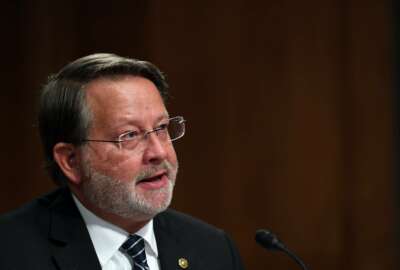Forts named after Confederate Generals could be sticking point for NDAA
In today's Federal Newscast, the 2021 defense authorization bill is hitting the home stretch, but this year seems a little more hamstrung than others.
To listen to the Federal Newscast on your phone or mobile device, subscribe in PodcastOne or Apple Podcasts. The best listening experience on desktop can be found using Chrome, Firefox or Safari.
- The 2021 Defense Authorization bill is hitting the home stretch, but this year seems a little more hamstrung than others. Members of the House and Senate are starting to negotiate the final details of the bill. Once they come to an agreement, the House and Senate each need to pass the bill again by majority vote and have the president sign it. The bill has been passed 59 years in a row. But this year there seems to be a big fight brewing over renaming bases dedicated to Confederate troops. The issue could throw a wrench in the final passage.
- The Army plans to release the results of its review of the command climate at Fort Hood, Texas on December 8. But as Federal News Network’s Jared Serbu reports, officials are setting the stage for discouraging news. In a video message to the force on Wednesday, Army Secretary Ryan McCarthy said he’s “deeply saddened” by the review’s findings. He said they show the service’s anti-sexual assault and harassment programs aren’t working, and the Army needs a new action plan to change that. The review was sparked, in large part, by the death of Army Specialist Vanessa Guillen, who prosecutors say was murdered by a fellow soldier at Fort Hood.
- The Defense Department needs some help taking out garbage, but it might be more complicated than you think. There are about 26,000 objects orbiting the Earth right now. And a lot of them are just a bunch of junk. Lost screws, broken antennas and defunct satellites are all hurtling around the planet at speeds as high as 15,000 miles per hour. That puts important working space assets at risk. The Space Force says it’s hoping new space businesses will be able to come up with creative ways to bring that junk down to Earth or cast it off into the great unknown. The service is asking companies to come forward with ideas on eliminating debris and reducing future debris from satellites and spacecraft. (Federal News Network)
- Senate Democrats are out with a new bill to block the Schedule F executive order. The legislation would simply nullify the EO and prohibit agencies from spending appropriated funding on its implementation. Senate Homeland Security and Governmental Affairs Ranking Member Gary Peters (D-Mich.) and nearly 40 other Democrats introduced the bill. It differs from the legislation House Democrats introduced last month. The Senate bill would retroactively nullify the Schedule F order back to the date of its signing in October. (Federal News Network)
- Waivers that let agencies put off meeting certain federal cybersecurity rules may be going away if a new bill from Senator Ron Wyden (D-Ore.) and Congresswoman Lauren Underwood (D-Ill.) makes it into law. The two Democrats introduced the Federal Cybersecurity Oversight Act that would shift from indefinite waivers to waivers that last one year. The legislation also would require the Office of Management and Budget to approve all waivers, instead of the current process by which the head of the agency can approve requests. Additionally, Wyden and Underwood would tell OMB to include a list of all waivers and a timeline for when the agency would meet the cybersecurity requirements as part of the annual FISMA report to Congress.
- The Office of Personnel Management is encouraging agencies to get involved with cybersecurity rotational programs for their employees. Agencies have new guidance from OPM on cyber details. They can participate in the president’s management council interagency program, the cyber reskilling detail program or the Federal Cybersecurity Rotation Program. Most details are 120 days long. Agencies that receive cyber detailees should assign meaningful projects and measure employees’ results. OPM says entry-level employees and executives will benefit if agencies offered cyber rotational assignments more frequently.
- Agencies are getting some help in evaluating technologies that use 5G. As 5G enabled devices become more widely available, the Federal Mobility Group’s 5G and Mobile Network Infrastructure Working Group offers a primer on how best to test and analyze these products. The new framework released yesterday will try to guide an agency in selecting testing capabilities, whether it’s building its own testbed, taking advantage of external lab services, or using a hybrid approach. The working group spent the past year visiting labs operated by cell phone equipment manufacturers, mobile network operators, federal agencies and academia to better understand what goes into an evaluation effort.
- The Senate passed minimum security standards for Internet of Things devices and the bill is now headed to the President’s desk. The IoT Cybersecurity Improvement Act of 2020 requires the National Institute of Standards and Technology and the Office of Management and Budget to take steps to increase cybersecurity for IoT devices, plus publish guidance for reporting, coordinating, publishing and receiving information about security vulnerabilities.
- Two bills to boost federal technology are one step away from becoming law. The Senate passed the Modernization Centers of Excellence Program Act and the Artificial Intelligence in Government Act. Both bills now head to the President for his signature. The IT Modernization Centers of Excellence bill will codify the current IT COE effort to ensure agencies are moving to the cloud and adopting secure technologies. The AI bill will codify the AI COE in the General Services Administration and require OMB, the Office of Science and Technology Policy and GSA to issue new guidance for using the technology in government.
- Customer experience is under a microscope across federal government as the pandemic puts more pressure on agency services. But many web and technology employees see bright spots. During ACT-IAC’s CX Summit Wednesday, representatives from departments including Veterans Affairs, U.S. Citizenship and Immigration Services and the Food and Drug Administration described improved trust with customers and making the most of this once-in-a-lifetime opportunity to modernize the federal workforce for future remote opportunities. (Federal News Network)
- Federal agencies see telework as a solution to their recruitment and retention problems. The Transportation Department is considering it. The Labor Department is already offering some full-time remote jobs. Oklahoma Sen. James Lankford (R) said “We will always have in-person, and we should always be here in Washington, D.C. with our agency heads and all of those things to be able to interact for those face-to-face meetings that need to occur. But we have millions of people around the country that would love to be able to serve their country by serving in one of these agencies.” (Federal News Network)
- Airports might be nearly vacant, but the Transportation Security Administration has been busy on the contracting front. TSA says it met its annual small business contracting goals for the first time in the 19-year history of the agency. That amounted to $576 million worth of business. The effort was aided by the pandemic-related need for personal protective gear like acrylic barriers. TSA says it bought nearly seven thousand of those, along with four million face masks and 20,000 cases of hand sanitizer and wipes.
Copyright © 2025 Federal News Network. All rights reserved. This website is not intended for users located within the European Economic Area.
Eric White
Eric White is news anchor and Federal Drive producer at Federal News Network.
Follow @FEDERALNEWSCAST
Related Stories
Related Topics





